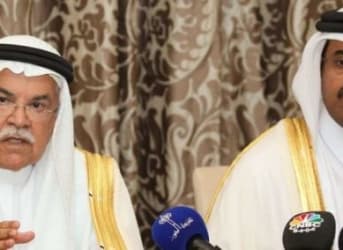Perhaps the biggest discussion in the oil industry right now is whether Saudi Arabia and other members of OPEC will freeze production or not. That’s a topic of major interest to investors large and small.
In a recent guest spot on radio program Stocks & Jocks, I discussed this topic with the host Tom Haugh and CNBC commentator and Option’s Monster Co-founder Jon Najarian. Najarian believes that Saudi Arabia will never agree to freeze production as long as they have the opportunity to hurt Iran. That is the probable course of action for the Saudi’s, but it shouldn’t be. Related: IEA Sees Oil Glut Gone By 2017
The Saudi’s interests would be better served from both and economic and a national security standpoint in freezing production, even if Iran refuses to cut its own production. Both assertions can be backed up by clean and clear cut models. Yet this view is likely to be extremely controversial – many traders out there believe that Saudi Arabia would be hurting its own economic interests were it to freeze production without coordinated action by other groups. That view is wrong.
The Saudi’s goal economically is to maximize profits over the long-term. This can be done by maximizing a combination of market share and price per barrel of oil. By not freezing production, the Saudi’s can at best maintain their existing market share while waiting for low prices to drive competing producers out of the market. That process is both slow and inefficient. The production losses for oil in both the short- and long -term are far smaller from a total revenue standpoint than the lost revenue from lower prices. Related: U.S. Oil Industry Fears That New Regulation Could Cost $25B
Put differently, the marginal profitability from price increases in oil is very high right now, while production is inelastic. Thus the Saudi’s can more efficiently generate profit by slowing their own production, which will help boost prices. As the Stackleberg leaders in the industry, Saudi actions have a significant impact on price, even though they no longer control the same share of the market that they once did.
Moreover, the Saudis have another tool that they can use to boost profitability and hurt Iran economically; price discounts. While oil trades at a transparent fixed price in many instances, that price is really just a benchmark. Producers deviate from that benchmark for a variety of reasons. American shale producers all adjust their prices based on the chemical composition of their crude and the transport costs associated with their location.
Similarly, many major national oil companies strategically price their oil to capture market share. For instance, the recently announced Iranian deal with India almost certainly included significant price concessions by Iran over and above the current price of crude. Iranian crude traded at an enormous discount to benchmark prices when sanctions were still in place. Related: Crude Oil Higher On Pre-Doha Hopes
These discounts become harder to offer and less significant as the price of oil falls. A $10 per barrel discount is likely to be untenable at $30 a barrel, whereas at $50 a barrel, it probably is feasible for some producers. Thus, as the price of oil rises, Saudi Arabia’s strategic options increase. The Saudis can freeze production leading to a rise in oil prices, and then ensure that all of their own oil sells, and sells to buyers Iran would like to target.
Taking this action has two important benefits for the Saudis. First, as the low cost producers, it enables them to strategically take market share while seeing the broader benefits from a general rise in prices, which would dramatically increase profitability. Second, it lets Saudi Arabia get more breathing room on price negotiations to keep Iran out of the market. That’s a win-win from the Saudi perspective.
By Michael McDonald of Oilprice.com
More Top Reads From Oilprice.com:
- The Undeniable Winners Of The Oil Bust
- Doha Is Just A Few Days Away. What Will It Mean For Oil Prices?
- What Are The Long Term Effects Of The Oil Crash For Canada?


















